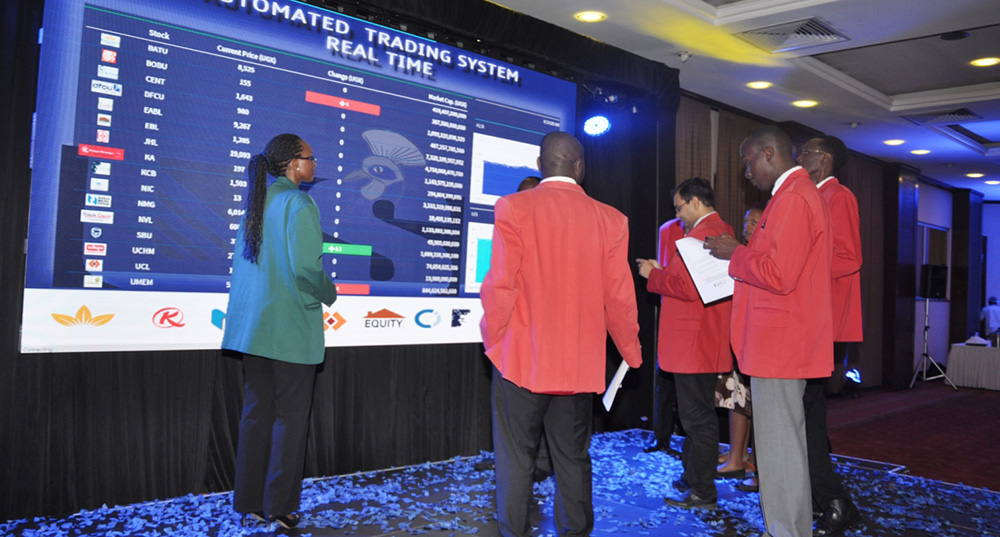Trading in the second quarter of 2020 registered a tremendous decline as Uganda’s equity markets continued to feel the impact of the COVID-19 pandemic.
“While the ultimate growth outcome is still uncertain, and an even worse scenario is possible if it takes longer to bring the health crisis under control, the pandemic will result in output contractions across the vast financial markets,” reads an excerpt from the periodic report.
It further states that, although Uganda is gradually easing the lock down measures instituted to contain the spread of the pandemic, the adverse consequences of the global impact of the pandemic on financial markets could persist through the remaining part of 2020. (Source: Bank of Uganda June 2020 Monetary Policy Report)
The second quarter of 2020 accounted for a total turnover of UGX 3.4 billion, compared to a combined total of UGX 25.6 billion that was traded between April & June 2019.
Turnover was realized on eight counters, which are summarized as follows; the UMEME counter took the first position, with a posting of UGX 3.1bn, accounting for 91.70 percent of the total turnover. Stanbic in second position accounted for 4.49 percent while Bank of Baroda Uganda, CIPLA, Uganda Clays Limited and DFCU posted 2.77 percent, 0.81 percent, 0.10 percent and 0.08 percent of the quarterly turnover, respectively. The rest of the counters represented by National Insurance Corporation; and New Vision Limited had a combined turnover of UGX 1.7million.
Performance
According to the activity report compiled by Uganda Securities Exchange, during the quarter, UMEME dominated activity, with 13.1mn shares traded taking up 62.01 percent of the volume, Stanbic recorded 30.05 percent of the volume with 6.4mn shares, while Bank of Baroda Uganda, Uganda Clays Limited, CIPLA and National Insurance Corporation posted 824,205 shares, 396,100 shares, 277,759 shares and 185,321 shares accounting for 3.88 per cent, 1.86 per cent, 1.31 per cent and 0.87 per cent of the total volume respectively. Dfcu and New Vision Limited recorded marginal positions.
“The All Share index opened at 1,305.84 rising steadily to a high of 1,396.52 in May but dropped gradually to close at 1,369.8. This trend was due to changes in different market prices and the exchange rate. The local share Index fell steadily from 342.21 to 340.14 in May 2020 and plunged further to close at 339.17 in June 2020. Below is the graph depicting the ALSI/LCI movements,” reads a statement from the quarterly report.
There were 6 treasury bonds re-opened in the quarter with a value of UGX 940 billion which were listed. Secondary market trading is over the counter (OTC) through primary dealers. The current total value of the Government Bonds listed on the bourse stands at UGX 12.6 Trillion.
Inflation remained relatively subdued with annual headline and core inflation averaging 3.4% and 3.8% in the second quarter of 2020 compared to 3.3% and 2.9% in the first quarter of 2020, respectively.
“Year on year headline inflation rose to 4.1% driven by higher annual core inflation as a result of high transport costs following the relaxation of COVID-19 lock down measures. Annual food inflation dropped to a deflation of 3.7% in the three months to June 2020 compared to 2.7% posted in the first quarter of 2020 due to lower prices of food, particularly bananas. Year on year Energy, Fuel and Utilities inflation increased to 8.3% in June 2020 from 7.7% in March 2020,” the USE statement has revealed.
Consistent with the slowdown of economic activity, inflation has remained subdued. The economic slowdown and a gradual recovery will keep inflation below the medium-term target of 5 percent in the near term (12 months ahead).
The report also states that inflation is forecast to return to the target in the medium term (2-3 years). Moreover, external sources of inflation are likely to remain weak in the near term amid the global economic downturn and food crop inflation is also expected to remain contained. Risks to inflation from shilling depreciation are expected to stay low as pass-through of exchange rate depreciation to inflation is expected to remain slow due to subdued demand. (Source: Bank of Uganda June 2020 Monetary Policy Report, Uganda Bureau of Statistics).


 Redefining the CFO Role in Oil and Gas: How UNOC’s Emmanuel Mugagga Is Executing Strategy for National Impact
Redefining the CFO Role in Oil and Gas: How UNOC’s Emmanuel Mugagga Is Executing Strategy for National Impact


